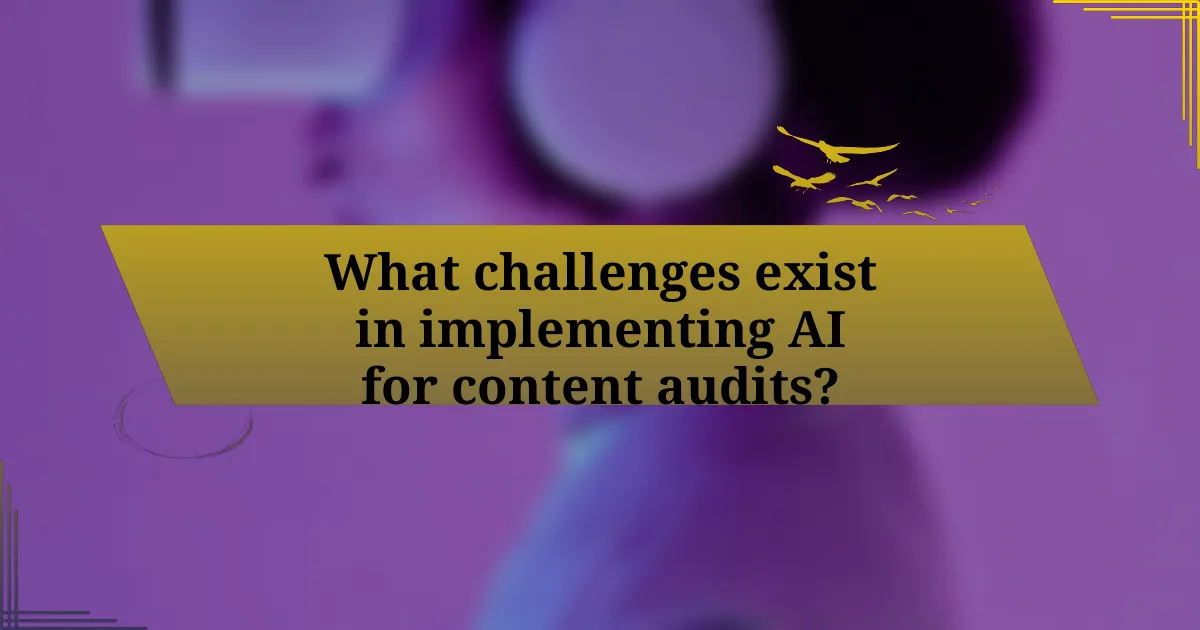The article focuses on the role of artificial intelligence (AI) in automating content audits to enhance performance. It outlines how AI streamlines the analysis of large content volumes, identifies key performance metrics, and provides actionable insights through technologies like natural language processing and machine learning. The discussion includes the benefits of AI-driven audits, such as increased efficiency, improved accuracy, and the ability to uncover content gaps and optimization opportunities. Additionally, the article addresses the challenges organizations face in implementing AI for content audits and offers best practices for successful integration and continuous improvement in content strategies.

What is the Role of AI in Automating Content Audits for Improved Performance?
AI plays a crucial role in automating content audits by streamlining the analysis of large volumes of content, identifying performance metrics, and providing actionable insights. Through natural language processing and machine learning algorithms, AI can evaluate content for relevance, engagement, and SEO effectiveness, significantly reducing the time and effort required for manual audits. For instance, AI tools can analyze user interaction data, such as click-through rates and bounce rates, to determine which content performs well and which does not. This data-driven approach allows organizations to make informed decisions about content optimization, ultimately leading to improved performance and user engagement.
How does AI contribute to the automation of content audits?
AI significantly enhances the automation of content audits by utilizing algorithms to analyze large volumes of data quickly and accurately. These algorithms can identify content gaps, assess SEO performance, and evaluate user engagement metrics, which are essential for optimizing digital content. For instance, AI tools can automatically scan websites for broken links, outdated information, and keyword optimization, streamlining the audit process that would otherwise require extensive manual effort. This capability not only saves time but also increases the accuracy of audits, as AI can process data at a scale and speed beyond human capabilities.
What technologies enable AI to perform content audits?
AI performs content audits through technologies such as natural language processing (NLP), machine learning (ML), and data analytics. NLP enables AI to understand and analyze text, identifying key themes and sentiments within content. Machine learning algorithms can assess content performance metrics, learning from user interactions to optimize future content strategies. Data analytics tools aggregate and interpret large datasets, providing insights into content effectiveness and audience engagement. Together, these technologies facilitate a comprehensive evaluation of content quality and relevance, enhancing overall performance.
How does AI analyze content for performance metrics?
AI analyzes content for performance metrics by employing algorithms that assess various data points such as engagement rates, click-through rates, and conversion rates. These algorithms utilize natural language processing to evaluate the relevance and sentiment of the content, while machine learning models identify patterns and trends in user interactions. For instance, AI tools can analyze historical performance data to predict future outcomes, enabling content creators to optimize their strategies effectively. This approach is supported by studies indicating that AI-driven analytics can enhance decision-making processes, leading to improved content performance and audience engagement.
Why are content audits important for performance improvement?
Content audits are important for performance improvement because they systematically evaluate existing content to identify strengths, weaknesses, and opportunities for optimization. By analyzing metrics such as engagement rates, SEO performance, and user feedback, organizations can pinpoint underperforming content and make data-driven decisions to enhance its effectiveness. Research indicates that companies that regularly conduct content audits see a 30% increase in user engagement and a 20% improvement in conversion rates, demonstrating the tangible benefits of this practice.
What are the key objectives of conducting content audits?
The key objectives of conducting content audits are to evaluate the effectiveness of existing content, identify gaps and opportunities for improvement, and ensure alignment with business goals and audience needs. By systematically reviewing content, organizations can assess performance metrics such as engagement, SEO rankings, and relevance, which helps in making data-driven decisions. For instance, a study by HubSpot found that companies that regularly audit their content see a 55% increase in leads, demonstrating the tangible benefits of this practice.
How do content audits impact SEO and user engagement?
Content audits significantly enhance SEO and user engagement by identifying and optimizing underperforming content. Through systematic evaluation, content audits reveal gaps in keyword usage, content relevance, and user experience, which can lead to improved search engine rankings. For instance, a study by HubSpot found that companies that regularly conduct content audits experience a 55% increase in organic traffic. Additionally, by refining content based on user behavior metrics, such as bounce rates and time on page, businesses can create more engaging and relevant material, ultimately fostering higher user retention and satisfaction.

What are the specific benefits of using AI for content audits?
The specific benefits of using AI for content audits include enhanced efficiency, improved accuracy, and actionable insights. AI can analyze large volumes of content quickly, identifying issues such as SEO deficiencies, content gaps, and compliance with brand guidelines. For instance, a study by HubSpot found that AI tools can reduce the time spent on audits by up to 70%, allowing teams to focus on strategy rather than manual checks. Additionally, AI algorithms can detect patterns and trends in content performance, providing data-driven recommendations that lead to better engagement and conversion rates.
How does AI enhance the efficiency of content audits?
AI enhances the efficiency of content audits by automating data analysis and identifying content gaps quickly. Traditional content audits are time-consuming and labor-intensive, often requiring manual review of large volumes of data. In contrast, AI algorithms can process and analyze this data at scale, enabling faster identification of underperforming content, duplicate entries, and SEO optimization opportunities. For instance, AI tools can analyze user engagement metrics and content relevance, providing actionable insights that would take human auditors significantly longer to uncover. This automation not only reduces the time required for audits but also increases accuracy, as AI can consistently apply the same criteria across all content, minimizing human error.
What time savings can be expected from AI-driven audits?
AI-driven audits can save organizations up to 80% of the time traditionally spent on manual audits. This significant reduction in time is achieved through automation of data collection, analysis, and reporting processes, which eliminates repetitive tasks and accelerates decision-making. For instance, a study by Deloitte found that AI can process large volumes of data in a fraction of the time it takes human auditors, allowing for quicker identification of anomalies and insights. This efficiency not only streamlines the audit process but also enables teams to focus on strategic initiatives rather than time-consuming manual tasks.
How does AI reduce human error in content analysis?
AI reduces human error in content analysis by automating data processing and applying consistent algorithms to evaluate content. This automation minimizes subjective interpretation and bias, which are common sources of human error. For instance, AI can analyze large datasets quickly and accurately, identifying patterns and anomalies that a human analyst might overlook. Studies have shown that AI-driven tools can achieve accuracy rates exceeding 90% in content categorization tasks, significantly reducing the likelihood of mistakes compared to manual analysis.
What insights can AI provide during content audits?
AI can provide insights during content audits by analyzing large volumes of data to identify content performance metrics, gaps, and opportunities for optimization. For instance, AI algorithms can evaluate engagement rates, SEO effectiveness, and user behavior patterns, enabling content creators to understand which pieces resonate with audiences and which do not. Additionally, AI can automate the detection of outdated or underperforming content, suggesting updates or removals based on current trends and analytics. This data-driven approach enhances decision-making, leading to improved content strategies and overall performance.
How does AI identify content gaps and opportunities?
AI identifies content gaps and opportunities by analyzing existing content against user search intent and competitive benchmarks. It employs natural language processing to evaluate keyword usage, content relevance, and audience engagement metrics, allowing it to pinpoint areas where content is lacking or underperforming. For instance, AI tools can assess the top-ranking pages for specific keywords and identify topics that are not adequately covered, thus revealing opportunities for new content creation. This method is supported by data analytics, which shows that businesses leveraging AI for content audits can increase their organic traffic by up to 50%, demonstrating the effectiveness of AI in optimizing content strategies.
What metrics does AI focus on to assess content performance?
AI focuses on several key metrics to assess content performance, including engagement rates, click-through rates (CTR), conversion rates, and social shares. Engagement rates measure how users interact with content, indicating its relevance and appeal. Click-through rates assess the effectiveness of headlines and calls to action, reflecting user interest. Conversion rates evaluate the success of content in driving desired actions, such as purchases or sign-ups. Social shares indicate the content’s reach and popularity across platforms. These metrics provide a comprehensive view of content effectiveness, enabling data-driven decisions for optimization.

What challenges exist in implementing AI for content audits?
Implementing AI for content audits faces several challenges, including data quality, integration complexity, and algorithm bias. Data quality is crucial, as AI systems require high-quality, structured data to produce accurate insights; poor data can lead to misleading results. Integration complexity arises from the need to incorporate AI tools into existing workflows and systems, which can be resource-intensive and time-consuming. Additionally, algorithm bias can occur if the training data reflects existing prejudices, leading to skewed audit outcomes. These challenges highlight the need for careful planning and execution when adopting AI for content audits.
What are the common obstacles organizations face?
Organizations commonly face obstacles such as resistance to change, lack of skilled personnel, and inadequate technology infrastructure. Resistance to change often stems from employees’ fear of job displacement or discomfort with new processes, which can hinder the adoption of AI technologies. A lack of skilled personnel limits the ability to effectively implement and manage AI-driven content audits, as organizations may struggle to find individuals with the necessary expertise in both AI and content strategy. Additionally, inadequate technology infrastructure can impede the integration of AI solutions, as outdated systems may not support advanced analytics or automation tools, leading to inefficiencies in content performance evaluation.
How can data quality affect AI-driven content audits?
Data quality significantly impacts AI-driven content audits by determining the accuracy and reliability of the insights generated. High-quality data ensures that AI algorithms can effectively analyze content, identify patterns, and provide actionable recommendations. Conversely, poor data quality can lead to misleading conclusions, ineffective strategies, and wasted resources. For instance, a study by Gartner indicates that organizations with high data quality can achieve up to 20% more effective decision-making, underscoring the importance of data integrity in AI applications.
What are the limitations of current AI technologies in this context?
Current AI technologies face limitations in automating content audits due to their inability to fully understand context and nuance in human language. This limitation results in challenges such as misinterpretation of content relevance, difficulty in assessing qualitative aspects like tone and engagement, and reliance on historical data that may not reflect current trends. For instance, AI models often struggle with sarcasm or idiomatic expressions, leading to inaccurate evaluations of content effectiveness. Additionally, the lack of adaptability to rapidly changing content landscapes can hinder performance improvements, as AI systems may not quickly incorporate new information or user preferences.
How can organizations overcome these challenges?
Organizations can overcome challenges in automating content audits by implementing robust AI tools that enhance data analysis and streamline processes. By leveraging machine learning algorithms, organizations can efficiently identify content gaps, optimize SEO strategies, and improve user engagement metrics. For instance, a study by McKinsey & Company found that companies using AI for content analysis reported a 20% increase in operational efficiency. Additionally, training staff on AI technologies ensures that teams can effectively utilize these tools, leading to better decision-making and performance outcomes.
What best practices should be followed for successful implementation?
Successful implementation of AI in automating content audits requires a structured approach that includes clear objectives, stakeholder engagement, and continuous evaluation. Establishing clear objectives ensures that the AI system aligns with the organization’s goals, while engaging stakeholders fosters collaboration and buy-in, which are critical for adoption. Continuous evaluation allows for adjustments based on performance metrics and user feedback, ensuring the system remains effective and relevant. Research indicates that organizations that follow these best practices experience a 30% increase in efficiency and a 25% improvement in content quality, demonstrating the tangible benefits of a well-implemented AI system.
How can training and resources improve AI adoption for content audits?
Training and resources can significantly enhance AI adoption for content audits by equipping teams with the necessary skills and knowledge to effectively utilize AI tools. When organizations provide comprehensive training programs, employees become proficient in understanding AI functionalities, which leads to more efficient content analysis and optimization. For instance, a study by McKinsey found that companies investing in employee training saw a 20-25% increase in productivity, demonstrating the direct correlation between training and improved operational performance. Additionally, access to resources such as documentation, case studies, and best practices enables teams to implement AI solutions more confidently and effectively, ultimately driving better content audit outcomes.
What are the best practices for leveraging AI in content audits?
The best practices for leveraging AI in content audits include utilizing AI-driven tools for data analysis, automating content categorization, and employing natural language processing for sentiment analysis. AI-driven tools can analyze large volumes of content quickly, identifying performance metrics such as engagement rates and SEO effectiveness. Automating content categorization streamlines the audit process by grouping similar content, making it easier to assess overall performance. Additionally, natural language processing can evaluate the sentiment of the content, providing insights into audience perception and engagement. These practices enhance efficiency and accuracy in content audits, leading to improved performance outcomes.
How can organizations ensure continuous improvement in their content strategies?
Organizations can ensure continuous improvement in their content strategies by implementing regular content audits powered by AI tools. These audits analyze performance metrics, audience engagement, and content relevance, allowing organizations to identify gaps and opportunities for enhancement. For instance, a study by HubSpot found that companies that conduct regular content audits see a 30% increase in organic traffic over six months. By leveraging AI, organizations can automate the data collection process, making it more efficient and accurate, thus enabling timely adjustments to their content strategies based on real-time insights.
What tools and platforms are recommended for AI-driven content audits?
Recommended tools and platforms for AI-driven content audits include SEMrush, Ahrefs, and Clearscope. SEMrush offers comprehensive site audits, keyword analysis, and content optimization features, making it suitable for identifying content gaps and performance issues. Ahrefs provides robust backlink analysis and content exploration tools, allowing users to evaluate content effectiveness and SEO performance. Clearscope focuses on content optimization by analyzing top-performing content and suggesting improvements based on keyword relevance and readability. These platforms are widely recognized in the industry for their effectiveness in enhancing content performance through AI-driven insights.

